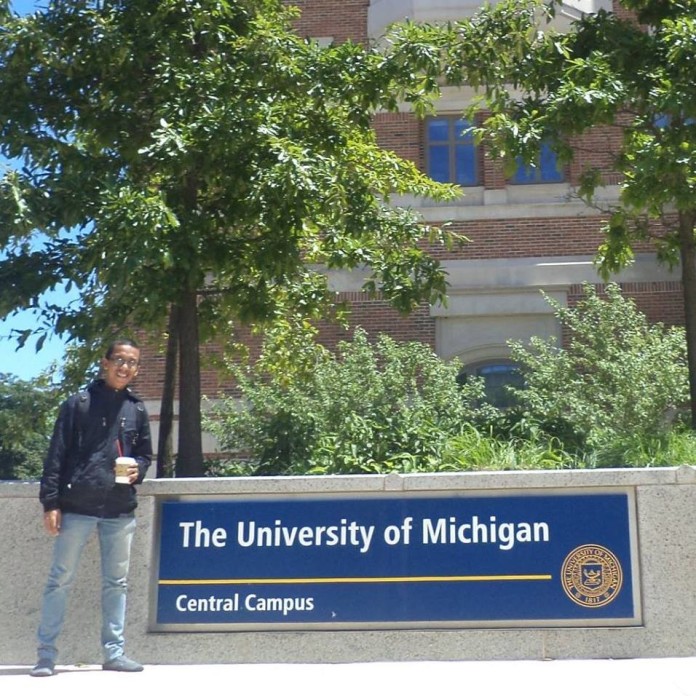Editor’s Note: What would your first impression of this individual be: born and raised in Tulungagung (yes, that’s a regency in Indonesia) by a Singapore-based domestic worker? Mine would be that this “person will change the world!” Meet Yoga, a graduate of Universitas Indonesia who studied at leading universities in the United States and Singapore and is currently siting in the Division of ASEAN Human Rights Advocacy at Human Rights Working Group (HRWG). He will share with IM readers his experience and how he overcame adversities to actualize his dreams.
The first steps of my life were taken with strenuous effort. My pregnant mother was deserted by her husband in great destitution, and the economic turbulence almost successfully pushed her to the brink of desperation. Mustering up some strength, my mother resolved to take up the job as a domestic worker in Singapore when I barely turned two, and I was then left in the care of my extended family. This whole experience of being ‘left behind’ and collaboratively reared was not easy. I invariably felt a twinge of envy of the fact that most of my peers were directly raised by their parents, while I had to take care of myself most of the time. But looking at the bigger picture, I realized that my upbringing was one that provided the necessary ingredients that molded me into a strong person that I am today.

Yoga in front of the University of Michigan Central Campus
Back in the day, it was difficult to communicate with my mother as my impoverished family could not afford to own a telephone. As such, letters became our only means of ‘weaving the loosened familial threads.’ Every three months or so, a postman would come by and handed a letter my faraway mother wrote to me. I was still four or five, and I had yet to comprehend any single word scribbled on it. I would ask my uncle to read out the letter, and I would sit patiently, listening to him. My eyes twinkled with overwhelming excitement. I was then determined to learn how to read and write, and within a few weeks, I improved significantly, though my handwriting was mostly illegible. I slowly developed a habit of writing and through these letters, I rejoiced in confiding my thoughts, fears and hopes to my mother. She wrote back, “Do well in school. I will work hard to ensure that you are provided for. I love you.” With an abundance of support and love from everyone, I pushed myself through the adversities and became the first from my school, SMAN 1 Ngunut, to be admitted to the University of Indonesia (UI), which would later leave a profound impact on my personal growth and worldview.

Yoga, graduating from Universitas Indonesia
During my undergraduate years at UI, I was exposed to and challenged by myriad views in ways that I had never imagined. It was here at UI that I first made friends with and had direct exposure to people of diverse backgrounds, be it faith, ethnicity, gender, sexual orientation, ability, and/or class. My mandatory reading list included many postcolonial literary works that offered a window into seeing the gross injustices around racism, slavery, colonialism, gender inequality and many other forms of injustice. At some point, I became so heavily impacted that I secretly shed tears in one of the lectures that discussed the institution of slavery across many parts of the world. These readings piqued my curiosity for further exploration, and to that end, I submitted a scholarship application to study in the United States on an exchange program jointly put together by Lehigh University (Pennsylvania), Towson University (Maryland) and University of Michigan. My application was declared successful, and at the tail end of semester 5, I set out, full of zest.
Throughout the program, I had the pleasure of visiting American Indian museums, African American museums, Holocaust Museum and Memorial, Sunni-Shia mosques, Black (mega)churches, synagogues, a Protestant-Catholic wedding ceremony, and many other places and events that represented unimaginably diverse colors of humanity. When I reflected on these experiences, I was struck by a sudden realization that people are just way too diverse to be lumped together into one single mess; each person has their own unique lived experiences that inform their interpretation of the world. I returned home, convinced that other people’s versions of the truth are just as valid to them as my version to me.
In semester 7, my scholarship application to the National University of Singapore came to fruition. This allowed me to reunite with my mother after 20 years of living separately and served a defining moment of my life. The first couple of weeks of my stay in Singapore were spent observing the gatherings of domestic workers that popped up in public spaces. I would come by to strike up little conversations with them. What came as a surprise to me was that these domestic workers were also singers, dancers, painters, photographers, bakers, hairdressers, and poets—images that almost never come up in mass media. To produce an alternative discourse to the often negative images that the media portray, my friends and I founded Voice of Singapore’s Invisible Hands, a project seeking to empower domestic workers so that they can raise their voices from the ground through literary writings to defy stereotypes attached to them.
Looking back, I realize that this journey of self-discovery is indeed not one to take for granted. There was a lot of struggle involved and the internal fight could be very intense. I am privileged for having had higher education and some international experiences, but even so, the underlying idea is the willingness to keep our minds open, to accept the fact that there are different versions of truth that exist in the mind of each person.











